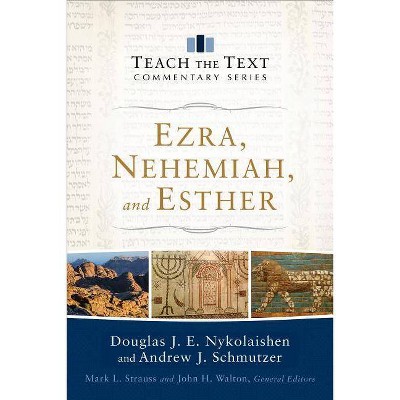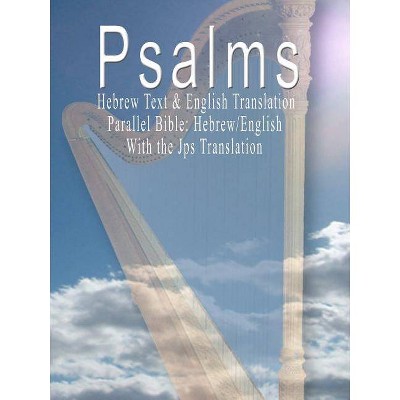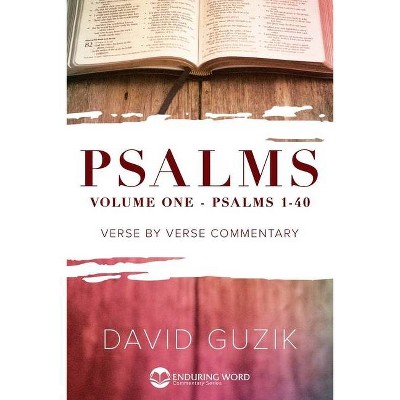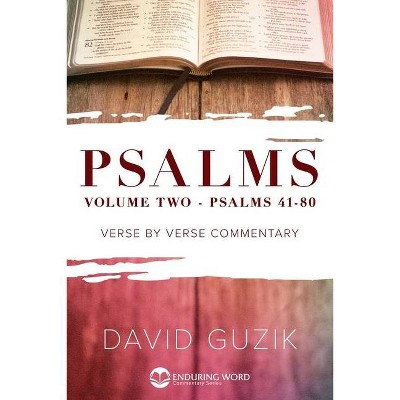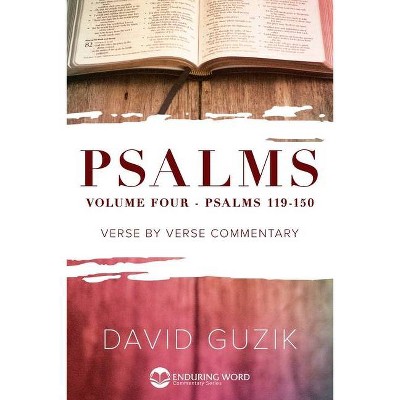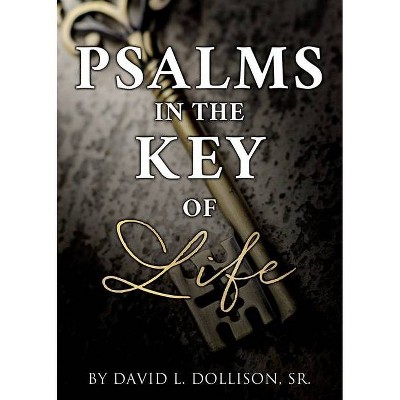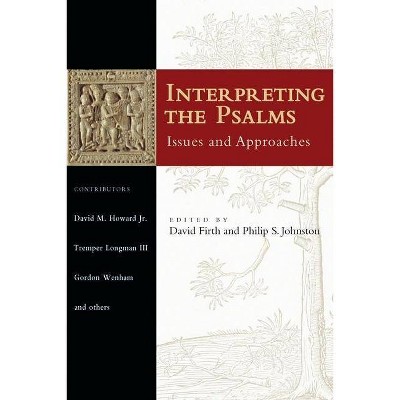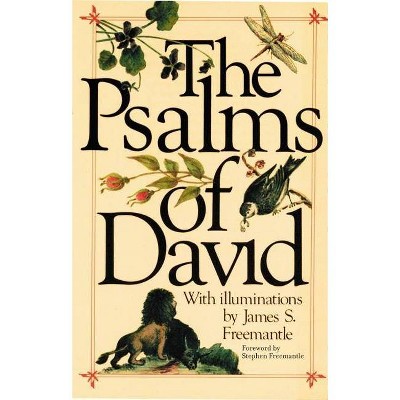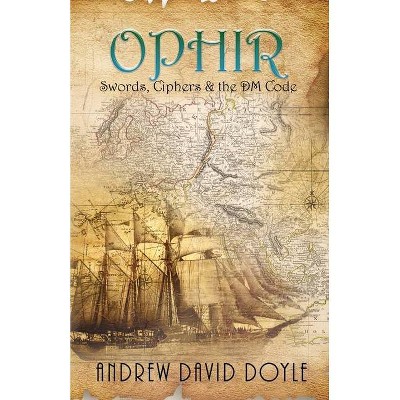The Psalms - by Andrew J Schmutzer & David M Howard Jr (Paperback)
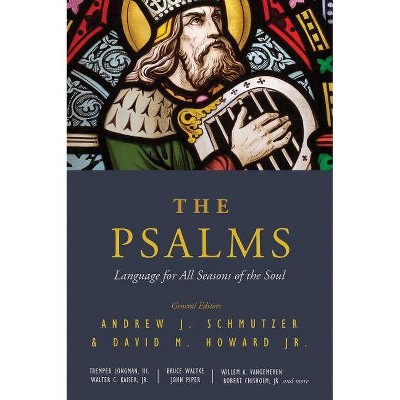
Similar Products
Products of same category from the store
AllProduct info
<p/><br></br><p><b> About the Book </b></p></br></br><p><i>The Psalms: Language for All Seasons of the Soul</i> brings together essays from eighteen Old Testament scholars discussing the latest in Psalms scholarship and applying exegetical insights to the life of faith. </p><p></p><p>These essays explore the full range of emotion expressed in the Psalms--from elation to distress--while weaving together observations from biblical scholarship and theology. The reader will gain valuable insights into how the Psalms speak to his or her soul. </p><p>The book is divided into five sections that: </p><ol><li>Give an overview of Psalms studies in the 21st century</li><li>Discuss psalms of praise</li><li>Explore psalms of lament</li><li>Look at the big picture of the Psalter as a book</li><li>Present sermons on the Psalms that are models of evangelical engagement with the text. </li></ol><p>A Select Bibliography for Psalms Study is included at the end of the book.</p><p/><br></br><p><b> From the Back Cover </b></p></br></br><p><i>The Psalms: Language for All Seasons of the Soul</i> brings together essays from eighteen Old Testament scholars discussing the latest in Psalms scholarship and applying exegetical insights to the life of faith. </p><p>These essays explore the full range of emotion expressed in the Psalms--from elation to distress--while weaving together observations from biblical scholarship and theology. The reader will gain valuable insights into how the Psalms speak to his or her soul. </p><p/><br></br><p><b> Review Quotes </b></p></br></br><br><p>A comprehensive overview of approaches to reading and interpreting the Psalms, from a conservative evangelical perspective.<br/>This book is a collection of 19 essays from various authors within evangelical Christianity. It is a dense and scholarly work. Pastors and theology students would probably be the ones to most benefit from this book. This is not to say that the average Christian sitting in the pews wouldn't benefit from reading these essays, but because of some of the technical content it may be difficult for the average reader to understand all that is contained.<br/>I, coming from a more liberal and progressive position, approached the reading of this book a little more skeptically. Although it was clear that I would not be in full agreement with many of the theological and interpretative positions held by most of the essayists, I was pleasantly surprised to discover the robust way in which they engaged opposing and differing views in a respectful manner.<br/>In spite of the fact that, in many instances, the essayists and I would likely reach different interpretive conclusions, I feel that they have offered me new tools that I can use to work through the Psalms. They have opened my eyes to a new way of seeing the Psalms.</p><p><i>- Mark Kubo, review in Net Galley, September 19, 2013</i></p><p>This book is a treasure of all things Psalms. Each chapter is not very long. There are well marked emphasis to help readers understand the structures of each argument. At the same time, the many perspectives summarized by each contributor will leave readers refreshed and encouraged by the diversity of views that will aid the diversity of worship. More importantly, it is a reminder to us that when God speaks, he does not just speak to any one people group. He speaks to all. Psalms is indeed a language for all seasons.<br/><br/>Rating: 4.75 stars of 5.<br/><br/><i>Review by Conrad Yape, October 11, 2013, Net Galley</i></p><p><b>Full Text: </b> I'mplanning on spending a lot of time in the Psalms this year so I've been looking for books that will help me get the most from my reading. The Psalms: Language for All Seasons of the Soul was the perfect book at the perfect time.<br/><br/>You will find the journey through this forest dense. It's not your entry level reading, but there's so much beauty to behold. It's worth the steady toil. Also, the chapters get gradually less technical. The last part gathers sermons on particular Psalms and so readability increases there.<br/><br/>The Psalms starts with big picture concerns. Three chapters discuss scholarship and studies on the Psalms and set the ground work for the methods and interpretation applied later. You might be tempted to skip over these chapters if you're not used to thicker reading, but they are important for understanding the concepts in later chapters. I appreciate the focus on the transcendence of the Psalms in this section (beyond the individual and corporate settings), the push back against Western individualism, and the encouragement to re-approach the faith tradition of our forefathers for understanding the Psalms (the church today, for instance, doesn't quite know what to do with lament, whereas traditions of the past were able to grasp and incorporate this into their everyday faith and liturgy).<br/><br/>The second and third parts forage for nourishment in the Psalms of praise and lament. For pastors who are looking to preach from the Psalms, these sections are where theory meets application and everyday life. You could live in these chapters for weeks. Our churches today seem comfortable in the Psalms of praise. We have an abundance of good praise songs--some of which directly pull from the Psalms of praise--but as stated earlier we are woefully confused when we approach laments. A few observations from the book about lament. First, lament is not the same thing as confession of sin. Lament and confession often travel together, but lament is more of a sorrow and grieving over sin. Second, lament and praise are often paired. Michael E. Travers quotes C. S. Lewis calling this pairing ""severe delight'" (125). Confession and lament can feel severe, but restored fellowship with God is a delight so we praise. Third, laments are complaints against God to God. This shouldn't be confused with grumbling like we see in Exodus. That was complaints about God but not to Him. One God encourages and other He judges. Last, laments force the believer to fall back on the promises of God (144). We see this time and time again in the Psalter's laments. You have this intense lament then a rehearsal of God's promises thereafter.<br/><br/>The fourth part looks at the Psalms as a whole. This section is concerned with the overall content, arrangement, and thematic unfolding. I enjoyed the first chapter in this section by Robert Cole. In it he argues that Psalms 1 & 2 are an introduction. He also demonstrates that the righteous man in Psalms 1 is revealed as the Messianic King in Psalms 2. As a whole, this fourth part provides new eyes for reading through the Psalms. All the authors did a great job focusing on the Messianic themes and structures in the Psalms. An excellent section for those looking to preach the Psalms with Jesus Christ as the center. The final section is filled with sermons and deals with communicating all the information provided previously in a way that engages. These are sermons that focus on Jesus Christ and Christians lamenting to God. I found these sermons as chapters a refreshing way to end an arduous journey.<br/><br/>For those who love the Psalms and also sense that there's an authentic spirituality found in them that's missing today, The Psalms provides a fresh and helpful way to read this biblical poetry. A way which turns our attention back to the corporate nature of Christian living. A way which turns our eyes to Jesus Christ and allows us to get a sense of the tension these early Christians experienced living before the advent of Messiah. A way which allows us to lament honestly to our God about the suffering we experience in the here and now.<br/><br/>Disclosure of Material Connection: I received this book free from the publisher. I was not required to write a positive review. The opinions I have expressed are my own. I am disclosing this in accordance with the Federal Trade Commission's 16 CFR, Part 255: "Guides Concerning the Use of Endorsements and Testimonials in Advertising."</p><p>Rating<b>: </b> 5 out of 5 stars</p><p><i>Review by Mathew Sims, Net Galley</i></p> <p></p><p>This compilation of essays taken from the dedicated work 18 Old Testament scholars, each with their own area of expertise, is not for the faint at heart of for the person looking for a light, devotional read. It is scholarly and it is in depth. The diamond that is the Psalms sparkles in these pages.</p><p><b>Rating: </b> 4 out of 5 stars</p><i>Review by </i><i>John Nielsen</i>, <i>Net Galley</i></p><br><p/><br></br><p><b> About the Author </b></p></br></br><b>ANDREW SCHMUTZER</b> (PhD, Trinity International University) is Professor of Biblical Studies at Moody Bible Institute (Chicago, Illinois). In addition to numerous articles and essays on the Old Testament, he has written the exegetical theology <i>Be Fruitful and Multiply</i> and two forthcoming commentaries on Ruth and Esther. <p/><b>DAVID M. HOWARD Jr</b>. (B.S., Geneva College; M.A., Wheaton College; A.M., Ph.D., The University of Michigan), is professor of Old Testament at Bethel Theological Seminary in St. Paul, Minnesota. He is the author of four books, including <i>An Introduction to the Old Testament Historical Books, What Makes a Missionary</i>, and <i>The Structure of Psalms 93-100</i>, as well as several dozen articles in scholarly journals and Bible encyclopedias. He resides in Shoreview, Minnesota.
Price History
Price Archive shows prices from various stores, lets you see history and find the cheapest. There is no actual sale on the website. For all support, inquiry and suggestion messagescommunication@pricearchive.us
